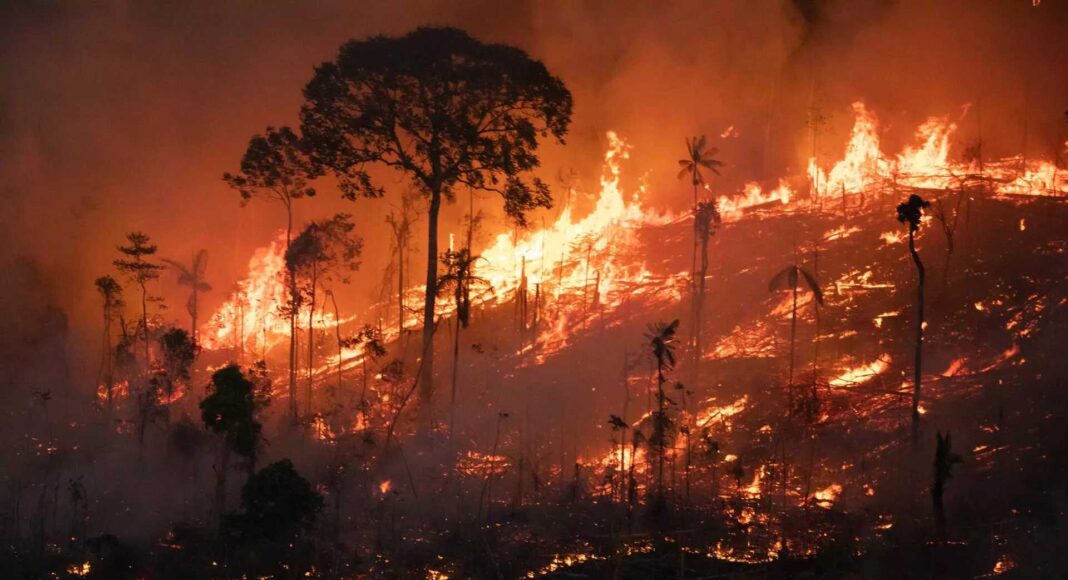On the one-year anniversary of this Amazon-centred news community, co-founder Jonathan Watts shares some of his favourite images from a year of enormous – and mostly positive – change, change that Sumaúma readers helped to make possible.
This article is reproduced by kind permission of Sumaúma. You can see the original here.
Sumauma, journalism from the centre of the world, is based in Altamira, Pará, in the Brazilian Amazon. It was established one year ago by Eliane Brum, Jonathan Watts, Verônica Goyzueta, Talita Bedinelli and Carla Jiménez. They say, in their founding Manifesto:
Based in Altamira, in the Middle Xingu region of Pará state, SUMAÚMA takes a side. SUMAÚMA is an ally of those who defend enclaves of nature and centres of life. Altamira is the epicentre of both the destruction of the forest and resistance to this destruction. SUMAÚMA stands firmly on the side of life. We want to be part of a transformation. We want to connect supporters in distant cities with those fighting in the forest to protect our planetary life-support systems.
Main image: A 2022 burn in the Amazonian region where the states of Amazonas, Acre and Rondônia meet and form a type of ‘deforestation border.’ Photo: Nilmar Lage/Greenpeace
Born into fire
13 September 2022 – SUMAÚMA was born into a Brazilian Amazon that was burning as it had not burned for many years. Land owners were setting the forest ablaze to take advantage of the impunity offered by the ultra-right government of Jair Bolsonaro. SUMAÚMA was created as an act of resistance in the hot spot city of Altamira, Pará State. ‘As journalists, we stand with the forest-peoples on the front lines of the war now being waged against nature,’ proclaimed our manifesto. We promised to put the forest first, to amplify Amazon voices and to refocus political debate to the centres of life rather than money and power. Our means was a trilingual biweekly news platform and monthly podcast, supported by a network of partners and a community of activist readers.
Raised during an election
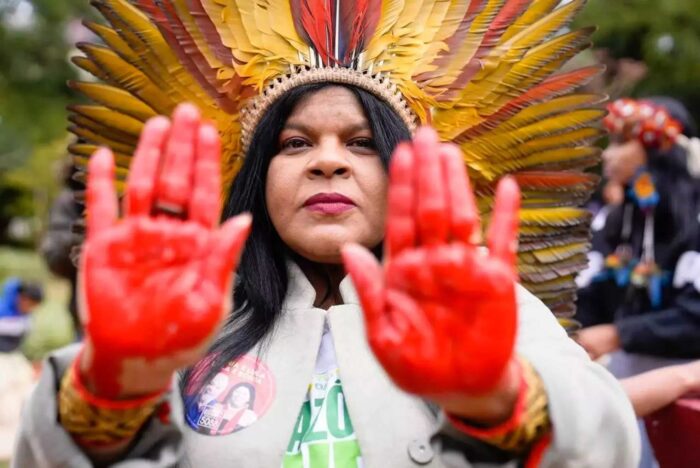
2 October 2022 – SUMAÚMA was rushed into being so we could play a part in the 2022 Brazilian elections. We immediately entered campaign mode. ‘It’s time to ‘indigenize politics and reforest minds,’ declared candidate Sonia Guajajara, who would later become the first minister for indigenous affairs, in an opinion piece for our second newsletter. The first had focussed on a series of exclusives from Yanomami territory by Talita Bedinelli and the anthropologist Ana Maria Machado about the sexual abuse of Indigenous women by illegal gold miners.
This was clearly interwoven with the destructive tendency of national politics. The dire situation for all forest life – human and non-human – could not improve without a change of power, argued our editorial, explaining why SUMAÚMA supported Workers Party candidate Luiz Inácio Lula da Silva as the best hope of defeating Bolsonaro, whose four years in power had seen the devastation of more than two billion trees. ‘Fight like a forest,’ exhorted our editor Eliane Brum, who also co-authored an article for the US Time magazine with Jonathan Watts in an early example of the partnerships that are a key part of SUMAÚMA’s strategy to spread the word from the forest to as large a readership as possible.
Reporting the return of Marina
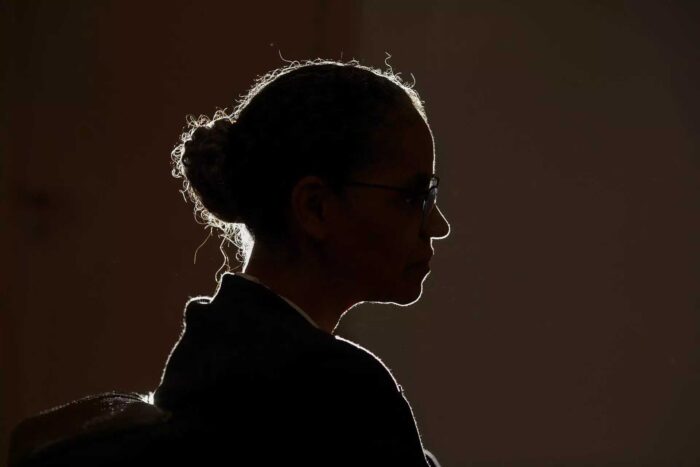
25 October 2022 – Brazil’s most influential Amazon-born politician Marina Silva explained why, after a 14-year political separation from Lula, she has decided to support him in the second-round presidential vote. In an exclusive interview with SUMAÚMA, the newly elected Congresswomen, says she believed Lula was the right man to salvage a socio-environmental agenda – focusing on climate action, poverty reduction and forest protection – that had been lost under Bolsonaro and his predecessors. Marina, who would later carry out that progressive policy as environment minister, a post that made her the primary target for the right wing and extractive industry. SUMAÚMA would go on to report on the political attacks against her, treachery by colleagues and the need for Lula to provide greater support if the government was to be at all useful.
Assessing Lula climate hopes
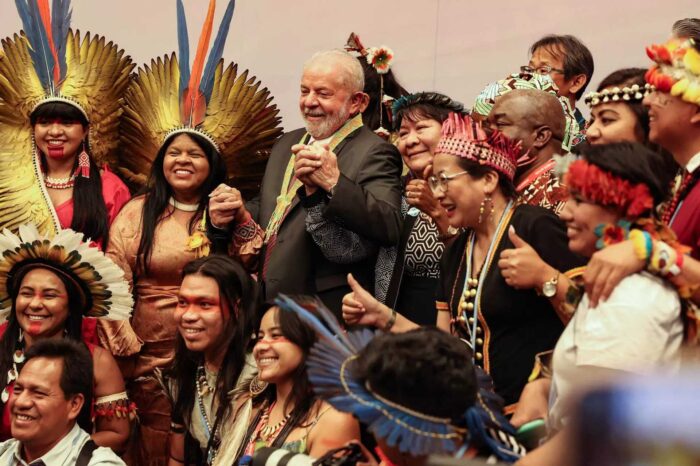
16 November 2022 – Lula was lauded at the COP-27 Climate Conference in Sharm el Sheikh following his narrow election victory over Bolsonaro and subsequent promise to aim for zero deforestation in the Amazon rainforest. This was arguably the most positive news for the climate anywhere in the world in 2023. Without succumbing to the euphoria, SUMAÚMA kept its focus on the indigenous demands at the COP in Egypt through another coverage collaboration, this time with the colombian independent media organization Agenda Propia, based in Colombia. We analysed Lula’s plans to create an alliance of biodiversity superpowers with Indonesia and the Democratic Republic of Congo and then examined the changes that the new government might bring when it took power on 1st January.
True to our mission to seek out and amplify forest voices, SUMAÚMA ran an extensive series of about hopes for the new government based on interviews with quilombola, riverine and Indigenous leaders, including Davi Kopenawa Yanomami, and young people. We also canvassed biologists as proxy representatives for other species, such as the zebra pleco fish, titi monkey, the dark winged trumpeter, the Prepona narcissus butterfly, and as-yet-undiscovered funghi.
These were optimistic times that peaked with Lula’s inauguration walk to the presidential palace arm-in-arm with Indigenous leader Raoni Metuktire Kayapo, After a couple of election victories and several high-level indigenous appointments in the new government, federal deputy Célia Xakriabá told SUMAÚMA: ‘Congress will no longer be gray. It will be the same color as us, the color of genipap and annatto.’
Defending democracy
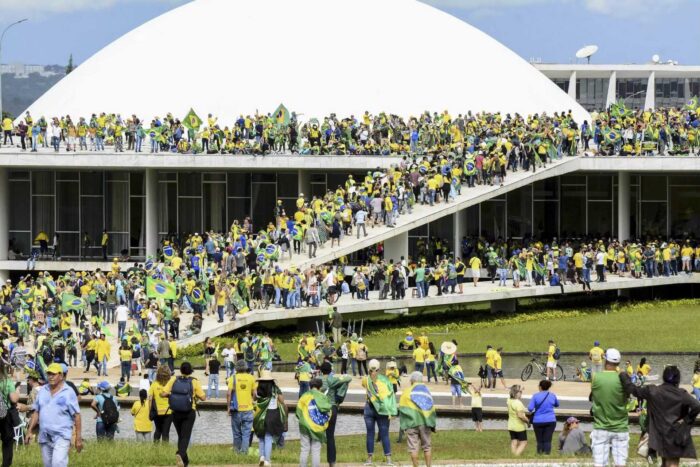
8 January 2023 – An attempted insurrection by Bolsonaro supporters wreaked havoc in Congress, the Supreme Court and the seat of government, the Palácio do Planalto. SUMAÚMA moved quickly to defend democracy. ‘The criminals who attempted a coup must be identified, located, tried and punished,’ we demand in an emergency editorial the following day that condemned the violence and insisted that Bolsonaro – who was conveniently ‘holidaying’ in Florida – return to Brazil to face justice. In follow-up articles, our reporters examine Lula’s claim that illegal miners and loggers from the Amazon were involved in the acts of terrorism, and name some of those who financed the disruption. The links between organized crime, politicians and environmental destruction is to be a central focus of our reporting.
Exposing a humanitarian crisis
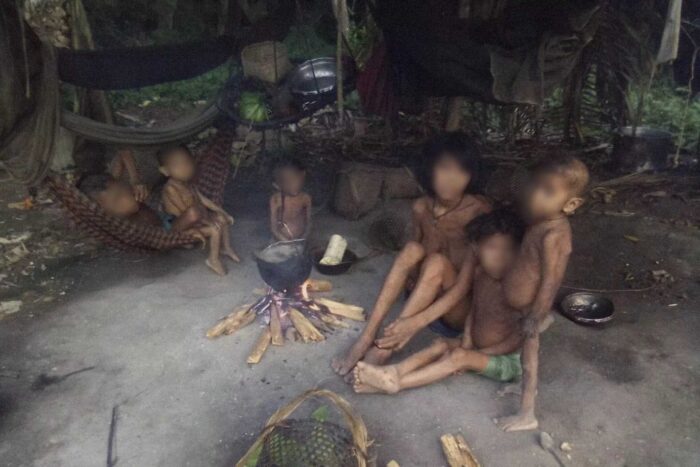
20 January 2023 – A long-simmering scandal of neglect and abuse inside Yanomami Land blew up into a full-scale humanitarian crisis after SUMAÚMA exclusively revealed 570 young Indigenous children had died in the previous 4 years from treatable diseases. This followed up on multiple stories, dating from our first edition, about the growing disaster caused by an invasion of illegal gold miners into Brazil’s biggest indigenous territory, which is supposed to be under the protection of the state.
The day after the story – ‘We are not even able to count the bodies‘ – was published, Lula declared an emergency, made an unscheduled visit to the area and dispatched medical teams. Having moved the government, SUMAÚMA reporters wrote mulitple follow-up stories and we launched a campaign to limit the use of gold for as long as the sellers are unable to prove a sustainable and ethical point of origin. Taking this into more detail, we ran a comment piece from two legal experts as part of a partnership with the law department of Kings College, London University.
Covering Davos in Amazonian style
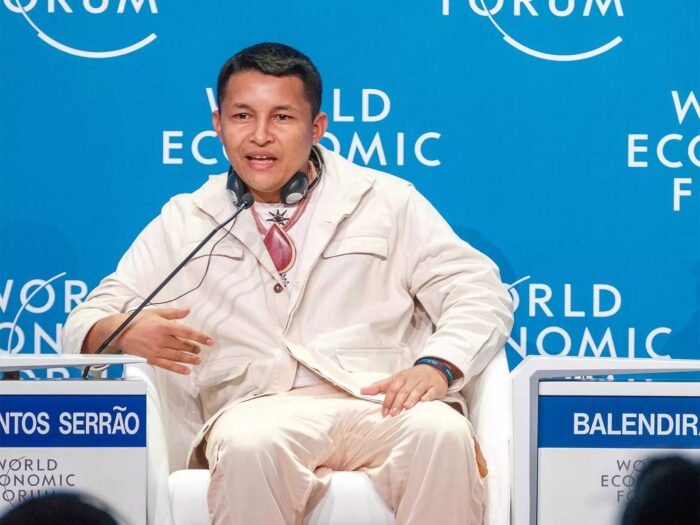
5 February 2023 – Representing the Amazonian city of Manaus at the World Economic Forum was a 30-year-old Indigenous riverside dweller, who among his many other qualities, is also one of the most stylish members of the SUMAÚMA podcast team. It is for this reason that Maickson Serrão is better known by his nickname of Pavulagem, which in his local dialect means a person who likes to show off. He did that to great effect in Davos, wearing an outfit by Amazonian designer Sioduhi, who has also been the subject of a SUMAÚMA profile.
Serrão used his flair to take a serious message to the delegates in Switzerland, namely that if they care about climate change then they have to support Indigenous people in Brazil against illegal miners, loggers and land grabbers. The forum released a document called ‘Incorporating Indigenous Knowledge in Landscape Conservation and Restoration’ that recognised the importance of native peoples in protecting globally important carbon sinks and centres of biodiversity. ‘Long overdue’ was Serra’s verdict in an interview about the experience. In-depth profiles and first-person opinion pieces are two of the ways that SUMAÚMA amplifies the voices of forest people. Other authors include the quilombola activist Natalha Theofilo, who described living in hiding with her family after receiving death threats, land activist Geraldo Magela de Almeida Filho, who recalled his 17-year experience as a fugitive after reporting the murder of the American nun Dorothy Stang, and Patri, a Venezuelan prostitute who revealed the dangers and difficulties of working in an illegal mining camp.
Questioning Belo Monte dam’s license
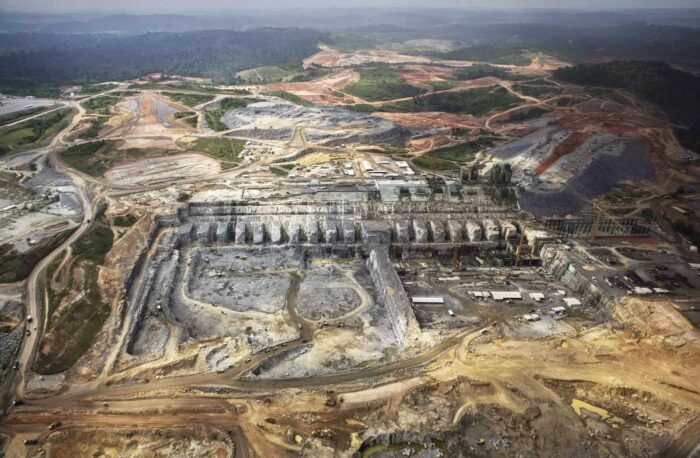
6 March 2023 – The most controversial infrastructure project in the Amazon is the vast Belo Monte hydroelectric dam on the Xingu River. With the operating license up for renewal, SUMAÚMA has urged Lula to reconsider his previous support given the wealth of evidence that the dam is causing more damage and generating less electricity than forecast. Amazon-based reporter Helena Palmquist and photographer Soll Sousa have followed teams of local people who are collecting data that the dam’s operator and environment authorities are reluctant to analyse. Among their findings are that the dam has turned a fish nursery into a cemetery, wrecking the livelihoods of fishers in the area, such as Raimundo da Cruz e Silva, who vividly recounts the loss of his catch. The story remains contentious, particularly since tribunals in Brasilia revealed the paucity of evidence for the dam’s hydrological regime.
Investigating oil projects
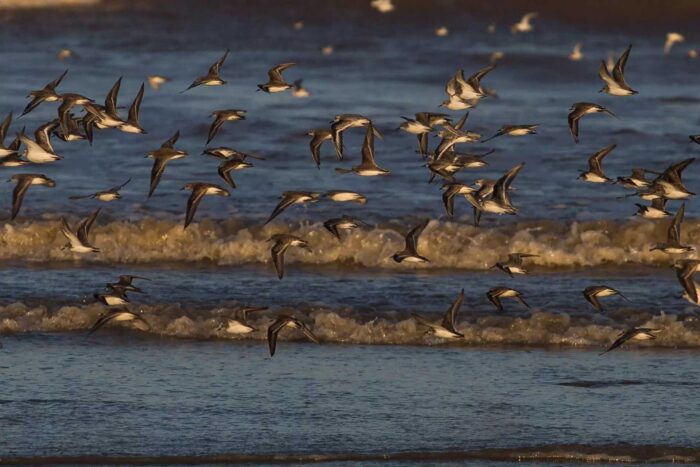
28 April 2023 – Petrobras’ plans to explore oil fields at the Mouth of the Amazon river have divided Lula’s government and caused many of its early tensions. On one side is the petrochemical industry and its supports. On the other is environment minister Marina Silva, who told SUMAÚMA that it was her personal opinion that the state oil company should look for another way to make money. Her ministry has lived up to this. SUMAÚMA revealed exclusively that a ministry study came out against the Amazon oil plan, which was entirely in line with domestic concerns about possible oil spills and global science advice that no new oil and gas projects should be approved if the world wants to avoid dangerous levels of heating. The battle rages on with Marina severely weakened by a hostile Congress and Lula offering only limp support. The twists and turns of this crucially important oil tussle has been covered every step of the way by Claudia Antunes, who has also written agenda-setting investigations of the carbon credit industry and the political push into the Amazon of Aldo Rebelo, a former ally of Workers’ Party presidents Lula and Dilma Rousseff, who now mixes with Bolsonaro supporters and landgrabbers in Altamira where he promotes an agricultural-military agenda.
The links between the Amazon and climate change are also covered in editorials, interviews with scientists and partnerships with the gifted writers involved with the Colapso project organized by the Mexico-based Dromómanos collective.
A battle over demarcation (Marco Temporal)
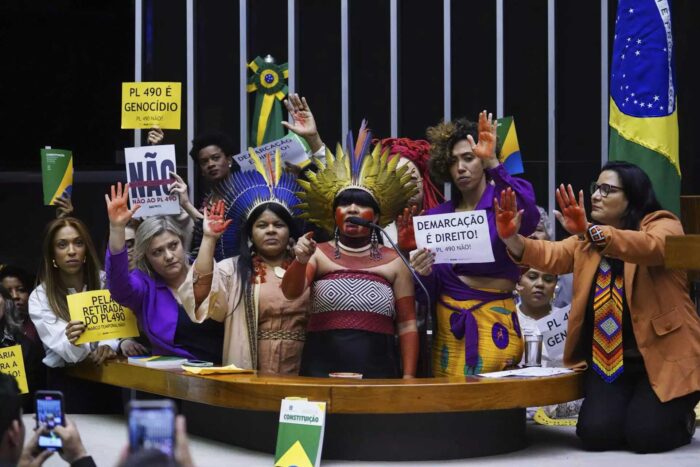
31 May 2023 – Even without the strong argument of historical justice, the value of demarcating more indigenous lands has been proven by numerous scientific studies that show it is the most cost-effective way to protect forests, sequester carbon and maintain habitats for wildlife. This logic encouraged Lula and his ministers to approve new territories (six in April and two in September), but with more planned, the landowner-dominated Congress has plotted a new ruse to slow – or even reverse – the approval of more territories. The marco temporal (historic cut-off point) bill would set unfair limitations on demarcations. Unsurprisingly, it is being fiercely opposed every step of the way. SUMAÚMA has covered and explained every stage of this debate from the passion and color of the Free Land camp in Brasilia to the bitter battles in Congress and the Supreme Court. ‘No democracy without demarcation’ is the rallying cry that we have heard again and again. The maracas of protest will not be silenced.
Remembering Bruno and Dom
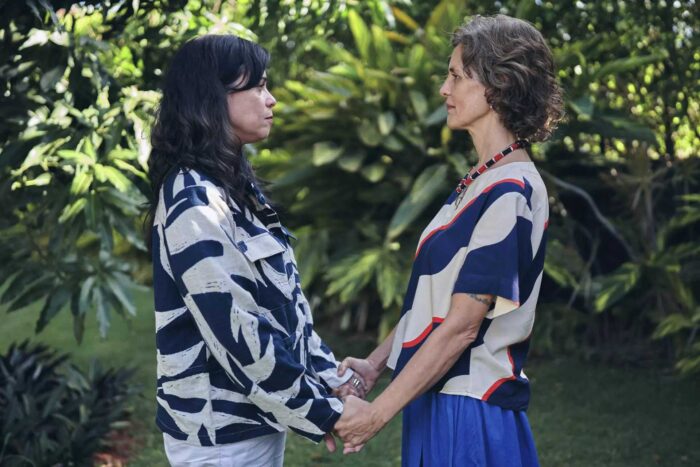
7 June 2023 – One year after the murder of Brazilian Indigenous expert Bruno Perreira and British journalist Dom Phillips in the Javari Valley, their widows are determined to keep their husbands’ memories alive. SUMAÚMA organized a meeting of the two women, who are both campaigning for many of the same rainforest values that inspired their partners. Beatriz Matos, the widow of Bruno, has joined the government’s indigenous affairs agency. Alessandra Sampaio, Dom’s widow, is planning to set up an Amazon education NGO. After the shock and grief of the heinous crime, they want justice, but they also want the deaths to help raise awareness of the importance of the rainforest, the Indigenous and other traditional communities who are its best protectors and the dangers faced by environmental activists and journalists.
The sentiments are echoed by Beto Marubo, the Javari Valley resident and Indigenous campaigners, who led many of the search missions that helped to locate the bodies of the two dead men. In a moving piece, he explained how different communities in the region mourned the victims and why they were determined that the deaths would not be in vain. SUMAÚMA founders Eliane Brum and Jonathan Watts, who were friends of Dom, could not agree more.
Adopting a Howler to tell the forest story
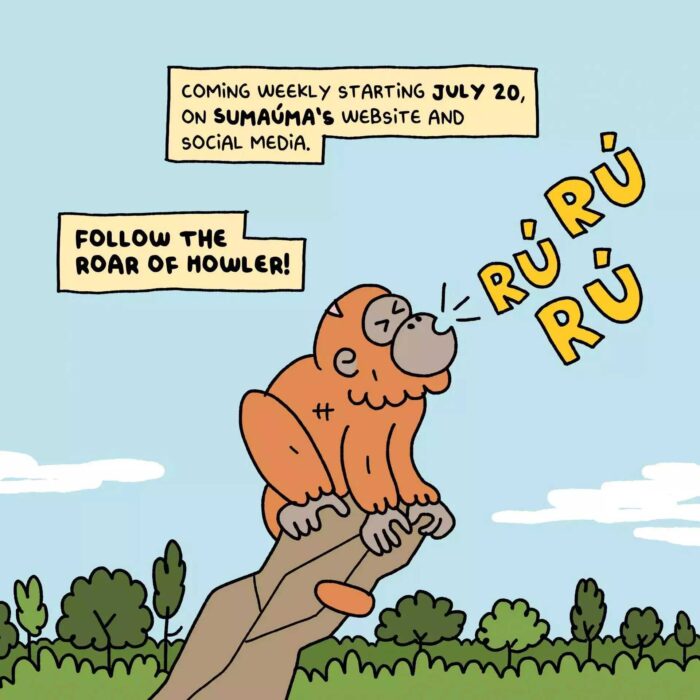
19th July 2023 – Burned, bruised and suffering amnesia, Howler is a monkey that needs to relearn the history of the Amazon so that he can find his family and defend his home. His story is that of an anti-Tarzan – not a human lord who learns to dominate the forest apes, but a primate who comes to understand the unwise ways of mankind. Beautifully illustrated by Pablito Aguiar, written by Jonathan Watts and mentored by Raimunda Tutanguira, this is a fantasy based on science and history that aims to take the wonders of the Amazon to a generation distanced from nature. The launch in July is in keeping with SUMAÚMA’s mission to find creative ways to represent non-human species and reach new audiences. We are constantly looking for new language and fresh ways of sharing a rainforest perspective to a wider world. As part of this, we have also launched a series of ‘jargon buster’ explainers by Claudio Angelo so that more people have the tools to participate in the global debate about the rainforest. Check out the first example on carbon credits. Many more to come. And much more on forest wisdom as we engage in to share ideas with storytellers from traditional communities.
Summoned by Raoni and Lula
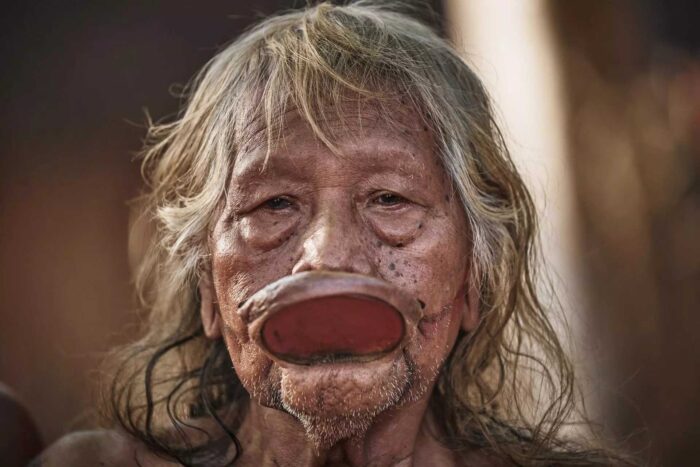
28 July 2023 – The revered Kayapó cacique (chief) Raoni Metuktire summoned Indigenous leaders and supporters from across Brazil to a meeting at the Piaraçu village in Mato Grosso, where the question of succession was on many people’s minds. Nobody knows Raoni’s birthday but he is thought to be in his nineties and while he remains remarkably sprightly, he acknowledges that he may not be able to maintain his current level of activism for much longer. Nobody could replicate him, but there are several potential candidates to inherit his mantle. There is a small chance of a surprise as a new generation of women leaders, including Sonia Guajajara, Joenia Wapichana, Alessandra Korap Munduruku and Juma Xipaya now have political power and visibility undreamed of even ten years ago. SUMAÚMA was there too and noted the dissatisfaction among those present that Lula declined an invitation on health grounds. Lula had his own meeting to prepare – the Amazon summit in Belém, which proved a lively exchange of ideas about the future of the rainforest albeit with few concrete commitments and a marked reluctance to tackle the issue of oil and gas exploitation in the region. Belém can expect much more of this as it is expected to host COP30 in 2025.
Federal agents take on organized crime
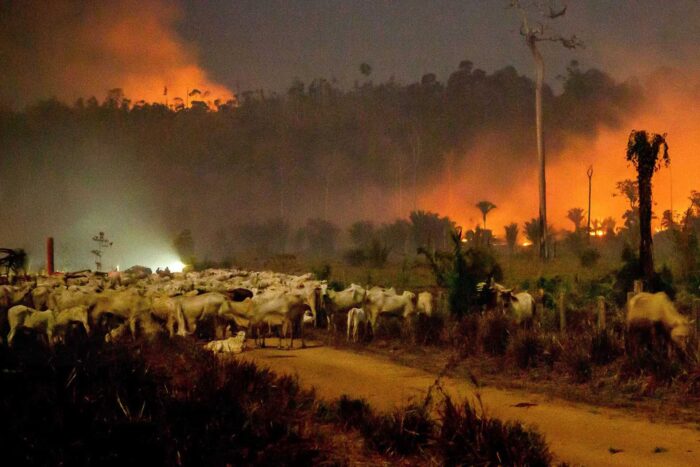
5 September 2023 – The federal government’s operations to confront illegal miners and ranchers in the Amazon has generated some of the most striking images of the past years. SUMAÚMA reporters have exclusive access to a mission in Pará state to remove thousands of cattle owned by land grabbers who had invaded indigenous territory. It was a tough trip as locals – most of whom rely on the illegal occupation for their livelihoods – damaged bridges, set fires and threatened drivers to impede progress. Even more violent resistance was evident in earlier operations to expel garimpeiros (illegal miners) from Yanomami territory. With narco trafficking gangs involved, this led to a few exchanges of gunfire.
The federal government’s efforts appear to be working. Deforestation has fallen by almost a half in the first eight months of this year compared to the same period in 2022. Destruction of the forest is a long way from zero, but it has slowed encouragingly. Best of all, there are many few fires than last year – and this time it is often the criminals machines of destruction that are burning, instead of the rainforest.
What a difference a year makes
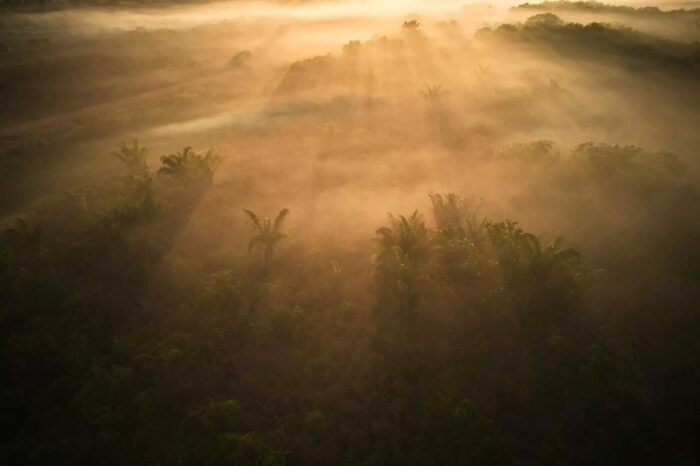
13 September 2023 – Since SUMAÚMA was launched, Brazil has changed in a positive way. The country now has a president who cares about the climate and the Amazon. Democracy has resisted an attack by forces aligned with environmental criminals. Federal actions have reduced deforestation and illegal mining, Indigenous women now hold senior positions in the government and eight indigenous territories have been demarcated. Lula and Marina are committed to zero deforestation by 2030, but there is still a long way to go, especially when it comes to the threat posed by infrastructure projects and fossil fuel exploration. SUMAÚMA has also changed. From the five founders who put out the first edition, we now have 21 staff. Over the past twelve months, we have put out more than 210 stories, all translated in three languages so the voices of the forest can reach a wider audience. Our social networks have conquered more than 100,000 followers and our newsletter has about 6,000 subscribers. Our community is growing stronger. Almost 1,700 people now contribute to our crowdfunding campaign, many of them participating in editorial meetings and webinars. We thank them and philanthropic donors for supporting SUMAÚMA and giving us the capability to be part of a positive change in the Amazon. Nobody is resting on their laurels. There is much work to be done and we have many new campaigns and initiatives to launch, but we are happy to share this happy anniversary with everyone who has made it possible. Thank you all.
Fact check: Plínio Lopes
Spell check (Portuguese): Elvira Gago
Translation into Spanish: Meritxell Almarza
Portuguese translation: Denise Bobadilha
Photography editing: Lela Beltrão
Page setup: Érica Saboya

